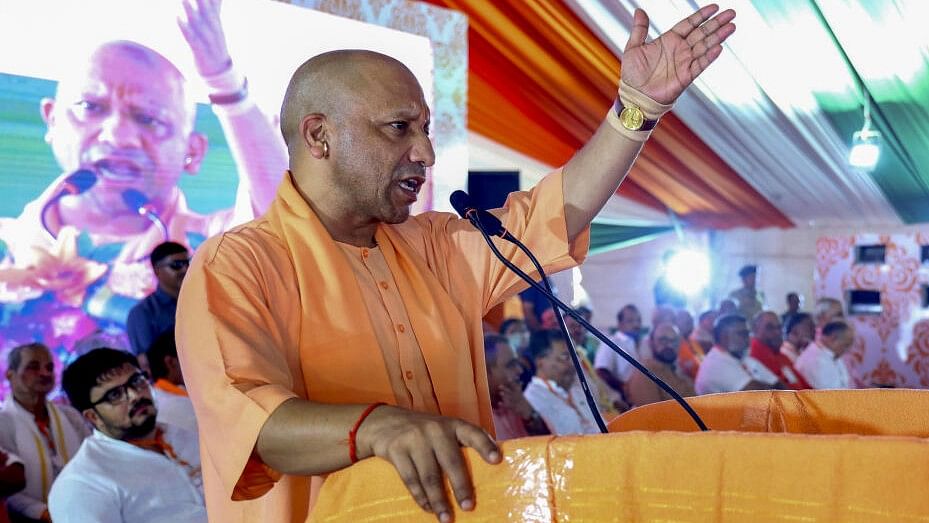
Uttar Pradesh Chief Minister Yogi Adityanath.
Credit: PTI File Photo
Lucknow: A day after a Varanasi court rejected an application by the Hindu side seeking a ban on ‘namaz’ (prayer) on the roof of the contentious Gyanvapi mosque’s cellar, Uttar Pradesh chief minister Yogi Adityanath on Saturday said that Gyanvapi was in fact ‘Vishwanath’ (Lord Shiva) and not a mosque.
"Durbhagya se Gyanvapi ko log doosre shabdon mein masjid kahte hain…lekin who Gyanvapi sakshat Vishwanath Ji hain," (Unfortunately people in other words call Gyanvapi a mosque but it is in fact Lord Shiva), Adityanath said while speaking at a seminar on ‘Nath Sect’ in Gorakhpur.
The chief minister referred to a story from the Hindu mythology regarding Adi Shankaracharya's encounter with Lord Shiva in Varanasi to buttress his contention.
‘’Lord Shiva, in the garb of an ordinary man who hails from a 'lower caste' performed a test on Acharya Shankar, when the latter visited Kashi (old name of Varanasi) after attaining knowledge about advaita (non-duality),’’ he said.
‘’Lord Shiva stood before Acharya Shankar, when the latter was going for a bath in the Ganga ... .the Acharya shouted at the person asking him to move away ... .then the person challenged his knowledge asking who does he want to move away,’’ Adityanath said.
‘’Is your (Acharaya) knowledge seeing this physical body?...Is it seeing the knowledge that lies inside the body….if the brahman is truth then what’s inside you is also inside me….it means your knowledge is not true,’’ Lord Shiva told the Acharya, Adityanath said.
A perplexed Acharya sought to know the true identity of the person and then the latter told him that he was ‘Vishwanath’ for whose worship the former had come to Kashi.
‘’The people, unfortunately, in other words call Gyanvapi a mosque", Adityanath added.
Earlier also Adityanath had virtually endorsed the claims of the Hindu litigants and asked the Muslim community to 'correct the historical mistakes'.
"There will be a dispute if I call Gyanvapi a mosque....those who have been given sight by the God should see, what's a trident doing inside a mosque? We didn't keep it there, the walls (of Gyanvapi) are screaming. There is a jyotirlinga, there are many idols," he had said.
Adityanath had, later, also cited the report of the Archaeological Survey of India (ASI), which had conducted a scientific survey of the contentious Gyanvapi Mosque premises and submitted the survey report in the district court earlier, to substantiate his claim.
‘’Kashi Vishwanath Dham is in Varanasi...you must have seen the ASI report on Gyanvapi Mosque...what does the report say?...it is an example before us’’, Adityanath had said at an event.
The premises had been a bone of contention between the two communities for the past several decades. The Hindu petitioners contended that a part of the temple had been demolished by the Mughal emperor Aurangzeb in the 17th century.
The Muslim side contended that the mosque existed before the reign of Aurangzeb.